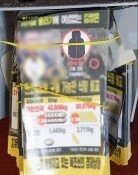What Is Behind North Koreas Demands to Redefine Northern Limit Line?
What Is Behind North Koreas Demands to Redefine Northern Limit Line?
Posted June. 27, 2007 03:12,
Yesterday, on the 25th anniversary of the Korean War, two North Korean state-run news agencies contended in their editorials, [If an armed conflict should break out again in the Yellow Sea], things will be a lot worse than the previous [2002] one. Our opponents will know what it feels like to engage in an all-out war.
Last week, the North Korean naval command warned, Our patience is running thin. Still, the South Korean government continues to ignore our warnings. If we are forced into action by the anger of justice, we will hold the South Korean government accountable for its misconduct in front of all Koreans. We never bluff.
All these contentions of the North can be traced back to certain fundamental issues. The North Korean top brass has consistently demanded their resolution at minister-level meetings between the two Koreas.
The issues concern the alleged legal and institutional barriers to unification. The North has been demanding, for example, abolishment of the National Security Act and rezoning of the NLL, or Northern Limit Line, since September 2005.
The North Korean delegation to the 21st ministerial-level talks, which were held from May 29 to June 1 this year, reportedly warned that the advancement of the relations between the two Koreas would not go anywhere without resolution of the issues.
Unification Minister Lee Jae-jeong commented yesterday, The 1992 pact between North and South contains the basic agreement [on the NLL]. [If necessary], we will hold more discussions with Pyongyang at future minister-level meetings.
Military experts say that the saber rattling is militarily as well as politically motivated.
They agree that Pyongyang has tried to push the NLL when it can. The North Korean military has also alleged that they have to defend its fishing fleet and expel illegal Chinese fishing boats. In the end, experts explain, the Kim Jong Il regime wants to claim sovereignty over the Yellow Sea within a 12 nautical mile radius from its southern tip. But the NLL blocks any such possibility.
Also, according to experts, the NLL allegation is another hidden card in the Norths brinkmanship diplomacy. Once tension is heightened, North Korea can use the matter in negotiations with Seoul or Washington.
Yet another interpretation says that active exchanges between the two Koreas might have loosened the bond among the inner circle of the regime. Thus, Kim Jong Il wishes to strengthen his internal control, and appease certain estranged generals.
Whatever the case might be, South Korean military believes that the NLL move is a calculated provocation to see how the South reacts.
The recent test-firing of a missile in the Yellow Sea seems to have been intended to trigger military tension, confirmed a senior officer who insisted on anonymity.
In a press release yesterday, the Ministry of Defense of South Korea countered, The U.N. first set the NLL in August of 1953. At that time, the naval power of the North had no substance. The NLL was a gift for them. Thats why they were silent on the matter for 20 years thereafter.
triplets@donga.com ysh1005@donga.com







